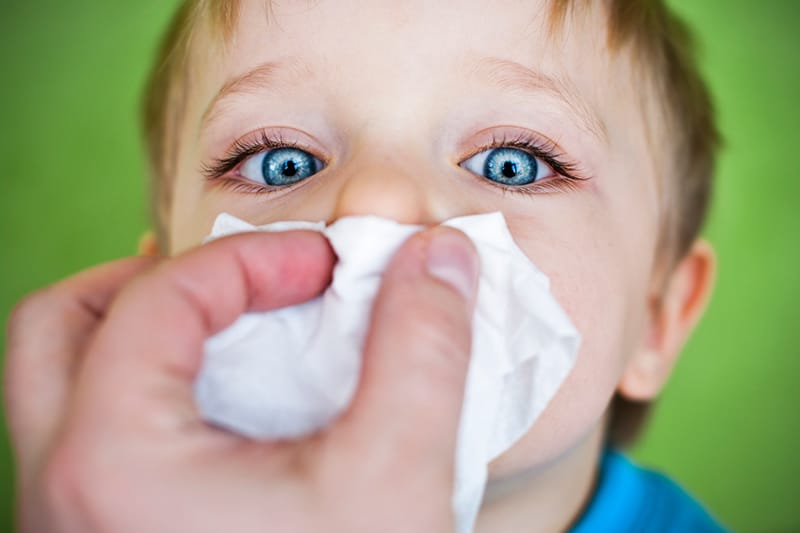By lunch on a day in mid-January, Dr. Ryan Tomlinson, pediatrician, had already seen nearly a dozen patients in his office at The Iowa Clinic in Ankeny. Eight of them had symptoms of a cold or other respiratory illness.
Just another day at the office for a pediatrician in cold and flu season.
"It's the precipitating factor for most visits this time of year. Two-thirds to three-quarters of all visits this time of year are respiratory illnesses of some form or another," he says.
The common cold can infect your child at any time of year, but it's almost inescapable in the winter months when we're all stuck indoors. And the risks are even greater for young children who pass infections back and forth like they're sharing candy.
What cold symptoms should I watch for?
You already know the classic cold symptoms — runny nose, congestion, sore throat, cough — but there are others to look out for.
"Occasionally, we see some nausea and vomiting. Usually, that's more related to the mucus that they're swallowing — it's upsetting their stomach. It's common with the little ones," says Dr. Tomlinson. "Low-grade fevers between 99° and 101°F are not uncommon with most colds."
Older kids can typically take these symptoms in stride. In children under the age of two, a cold can cause more serious issues. So there are several other things you want to keep an eye out for.
Fever
Fever guidelines are different for newborns. A rectal temperature that's above 100.4°F is an emergency. Children ages two months and younger who get a fever should be seen immediately. Even when the cause is a cold, a fever at that age is dangerous and must be treated.
Breathing Problems
For children ages two months to 18 months, congestion can make it harder to breathe. Infants' airways are smaller so they struggle to clear out the mucus that comes with a cold virus.
"They can have what we call retractions, where the skin between the ribs pulls in as the baby breathes, the tip of their nose flares out or, when it's severe, their head bobs. "They are working harder to breathe and need to be seen urgently," says Dr. Tomlinson.
Eating Issues
The congestion and breathing troubles can cause feeding issues as well. Babies who are breastfeeding or bottle feeding might not feed as well, putting them at risk for dehydration. The loss of fluid through secretion and fever compounds that risk.
When your baby has a cold, monitor their feeding more closely. If they aren't taking as much milk or formula as normal, count their wet diapers to make sure they're properly hydrated. One every six to eight hours is the bare minimum, Dr. Tomlinson says.
Is there anything I can do to treat a cold?
Colds must run their course. The only thing you can do is help relieve your child's symptoms until the virus passes.
"There's not a lot of things that help with a cough and mucus. There really isn't cough or cold medication for kids," says Dr. Tomlinson. "You see some over-the-counter medicines but, generally speaking, we don't recommend cough or cold medications to children under the age of 6."
The over-the-counter cold and cough products marketed for children recommend doses based on age. If you check the product labels, most say to consult your physician before administering it to your child. That's important because doctors make recommendations based on weight. You risk overdosing or underdosing your child if you use these medicines without your pediatrician's approval.
So what can you do? In lieu of medication, Dr. Tomlinson recommends:
- Humidifiers – Run a humidifier in your child's room at night to help loosen the mucus and make it easier to get out.
- Nasal suctioning – Use a bulb syringe or a NoseFrida on young kids who can't yet blow their nose. Mucus drains into the mouth more during sleep, so always do it before bed. For babies, do it before every feeding as well to help them breathe and eat better.
- Honey – A natural cough suppressant, honey can be given to children over the age of one year. "Just honey straight from the little bear off the grocery store shelf," says Dr. Tomlinson. "Only a teaspoon or so. You can mix it with a little lukewarm water to make it easier to swallow."
- Tylenol or ibuprofen – Children between the age of two and six months can take Tylenol to bring down a fever. Kids older than that can have either Tylenol or ibuprofen, dosed based on their weight.
What about natural cold remedies?
Since there's still no cure for the common cold and no medications commonly recommended to children 12 and under, many things have popped up to help relieve symptoms. They may claim to be safe for kids and assure you with their "all natural" ingredients. Dr. Tomlinson doesn't recommend you try any of them.
"We don't know exactly how much are in those preparations because they're not regulated by the FDA. When we don't know what's in them, there's potential for harm. So we don't typically recommend them even though you will see them on the market," he says.
On the list of things Dr. Tomlinson advises you avoid:
- Menthol-based topical creams – Topical ointments are dangerous if consumed, especially for younger children who tend to put their hands or feet in their mouths. These products can also cause a rash if they make contact with the face or mouth. If your sick kid is four or older, you can try putting some on the nightstand to reap the benefits of the menthol, but not anywhere on the body.
- Decongestants and cough suppressants – Many of the "natural" cold and cough products marketed for children say they're okay for kids down to two years old. They might be honey or syrup based. But like other natural cold remedies, their ingredients and makeup are not regulated or proven effective. If you want to use something, contact your pediatrician first. They can look up the ingredients, make sure the product is safe and recommend the right dosage for your child.
- Essential oils – Essential oils are another unregulated product that brings up more questions than answers. You probably won't know all the ingredients, the exact concentration of the extracted plant oil, the appropriate usage or the proper dosage for children. You also run the same risks of topical ointments by rubbing them on your child's body.
"The most effective natural remedy is actually just humidification to help soften up those secretions," says Dr. Tomlinson. "We recommend cool mist over a heated system due to the risk of bacteria that tend to grow in those heated humidifiers. And I wouldn't recommend adding anything to the water."
"Another way to do that with babies is to have them in their car seat or something else to secure them while you take a shower in the morning. It will add a little bit of humidity to the bathroom and help as well."
At what point should I call the doctor?
Judging by the number of patients with cold symptoms that pediatricians see every day, parents err on the side of visiting the doctor. That's a good idea, Dr. Tomlinson says. Colds can quickly turn into other things like ear infections or other respiratory illnesses. But if you're still wondering where the line is between a mother's care and a doctor's care, he says to make an appointment with your pediatrician if you see these signs:
- Wet diapers less frequent than every six to eight hours
- Crying without making any tears
- Mucous membranes lining the mouth that look dry
- Cracked lips
- Fever – above 100.4°F for infants or above 102°F for children 2 and up
When children are young, it can feel like they constantly have a cold. And you can easily reach your wit's end looking for answers to ease their symptoms. Before you start on a seemingly endless search for relief, consult your pediatrician about the best treatments and remedies to treat your child's specific symptoms and circumstances.


